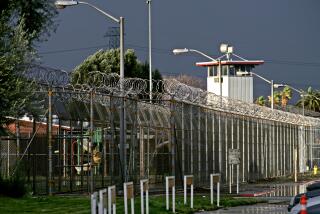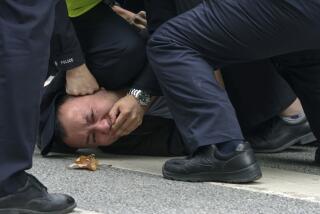China thinks of closing its reeducation prisons
- Share via
BEIJING — The former prisoner runs a dirt-stained hand over a scar on his forehead and recalls the pain of near-daily whippings by police guards at the Fuxin Reeducation Through Labor facility in northeast China.
“Since we didn’t get enough to eat and the work they forced us to do was so hard, we’d collapse, leading to a bad beating,” said Liu Jun, 36. “It was also a way for the police to remind you that bribing them would give you less work and more food.
“They enjoyed hurting you so much, sometimes we’d dream of killing them.”
Liu said his only crime was having the same name as a criminal; local police served as both judge and jury.
For 50 years, China’s Mao-era reeducation through labor, or laojiao, program has allowed police to sentence petty criminals or anyone they consider troublemakers to as many as four years of incarceration without trial. China’s parliament will consider reforming or abolishing the system during its annual session, which begins today, the state-run English-language China Daily said last week.
Real power in China is held by a small group of Politburo members, but the National People’s Congress provides insights into their thinking. Other items on the agenda for the 12-day session include measures to protect private property, end preferential treatment for foreign firms and reduce the budget deficit. Debates are expected on issues such as corruption, pollution and easing rural poverty.
The United Nations, Western governments and human rights groups as well as China’s Supreme People’s Court have roundly criticized the laojiao system. Domestic legal experts argue that it’s unconstitutional. And the imprisonment of an estimated 200,000 people in such a manner is an embarrassment as Beijing tries to burnish its image as host of the 2008 Olympics.
But getting rid of the entrenched system isn’t proving to be easy.
Lined up against its many critics is one major supporter. But in China’s single-party state, it’s a bruiser: the police.
The Ministry of Public Security’s argument resonates among the country’s top leaders: How do you expect us to safeguard your power in an era of growing unrest if you require us to follow the niceties of judicial process?
“They like its flexibility, allowing them to take large numbers of people off the street very quickly,” said Nicholas Bequelin, a Hong Kong-based China researcher with Human Rights Watch.
Some human rights activists see this struggle as evidence that Chinese authorities know they must edge toward rule of law, but don’t quite know how to get there. Others regard it as a clunky attempt at spin.
English-language newspapers such as the China Daily and Hong Kong’s South China Morning Post have run stories on the proposed reforms. However, virtually all state-run Chinese-language papers, media normally used to prepare the public for significant policy shifts, have remained silent.
Legal experts say draft reforms include reducing the maximum sentence to one year, better defining the appeal process, removing the high walls and electrified barriers often found around these facilities and placing greater emphasis on rehabilitation.
Still lacking is any clear evidence the program will fall under judicial control.
“It appears the Chinese government is trying to have its cake and eat it too,” said Robin Munro, research director with the Hong Kong-based China Labor Bulletin.
Even as police have fought encroachment on a system that lets them do what they want behind high walls, experts say, they are also in a bind.
Social problems such as drug addiction, prostitution and juvenile offenses treated abroad with specialty courts, misdemeanor charges or rehabilitation centers have landed in the laojiao system. Shuttering it overnight could leave a vacuum.
The system should be abolished, said Wu Ge, a law professor with the Constitution and Human Rights Center at Qinghua University. “The question is what can replace it, and what to do with its current occupants.”
For others, the issue is simpler. “These are essentially unmonitored sweatshops,” said Sara Davis, executive director of Asia Catalyst, a New York-based civic group.
“When a petitioner tries to publicize a local scandal, someone upsets their superiors, someone is unhappy with corruption, that’s been enough to land them in a laojiao facility,” said Hu Xingdou, an economics professor at the Beijing Institute of Technology.
Set up to handle petty thieves, fraudsters, counterrevolutionaries and “social parasites” not covered under criminal law, the laojiao system saw its peak use soon after it was established. But authorities also have used it to suppress unrest and imprison political rivals, as well as democracy protesters after the 1989 Tiananmen crackdown, members of religious groups and those who resisted the one-child policy.
Liu said he was incarcerated in Liaoning province for having the wrong name.
Someone accused the brother of a powerful police chief of bribery, Liu said, and he happened to have the same name. Rather than imprison the guilty man, they knowingly imprisoned Liu. After his first three-year term in the late 1980s, he tried to sue his tormentors. They tossed him in for another three years, he said.
His story could not be independently verified. Police in Beijing and Liaoning could not be reached or declined to comment.
Liu said there were so many men in a small cell that they had to sleep like sardines head to foot and turn over in near unison. Despite its name, the system placed little emphasis on education and lots on exploitative labor.
Inmates were forced to work 12-hour shifts doing heavy construction for private developers, he said, with the proceeds going into prison coffers or the pockets of police guards. They were fed twice a day, generally a single bun and watery soup.
The few inmates whose families could afford several hundred dollars a year in bribes had lighter work and better food. Families could send money for everyday items, but police stole most of it, he said.
Zhang, 44, who declined to give his first name, said he was treated relatively well during his two years at a laojiao facility in Jilin province because he knew some of the police.
But Zhang, who was incarcerated from 1998 to 2000 for a family-related issue he declined to elaborate on, said those without connections were beaten.
“Police put a Taser on one guy’s genitals when he didn’t work hard,” he said. “His body turned black and purple. The situation made some people so distraught, they would slam their heads against the radiator.”
Education sessions involved tedious lectures on loving the motherland and the importance of the constitution.
“This was a running joke,” Zhang said. “The laojiao isn’t even legal under the constitution, and they were telling us to respect the constitution.”
Fu Hualing, a criminal law specialist at the University of Hong Kong, said prisoners tended to face less abuse if their laojiao had contracts and was making money. Then “everyone’s life is easier,” he said.
Tiantanghe, an area 25 miles south of Beijing, houses several huge prisons and laojiao.
Most of the reeducation facilities were built in recent years, and there is little evidence the facilities will be abolished anytime soon. The staff quarters of a juvenile facility include a pagoda, rock garden and fake fluorescent blue, purple and yellow palm trees. Next door, patrolling police keep youngsters in place behind 20-foot concrete barriers.
Down the road, an even newer center for drug addicts boasts yellow and light blue concrete gates that match the main facility’s walls. A large sign at the entrance proclaims “Happy Chinese New Year.”
The laojiao network was almost shuttered during the Cultural Revolution, when China’s legal system all but stopped functioning. But it found a new role after 1979, when crime, drug use and prostitution soared with China’s economic opening.
Criminals convicted in court often are imprisoned for less than six months in facilities near home that allow monthly trips to see their family. Camp occupants often face stricter surveillance, little rest and no trips home.
Liu says that he was an accomplished marathon runner before the laojiao, but that the beatings and humiliation destroyed his career.
“Police don’t have to consider evidence, meet a judge’s standards or face a court,” he said. “They can give you several years at the stroke of a pen, or decide to beat you if they had a bad fight with their wife, and that’s it. In a word, we need human rights. Without human rights, we have nothing.”
More to Read
Sign up for Essential California
The most important California stories and recommendations in your inbox every morning.
You may occasionally receive promotional content from the Los Angeles Times.













